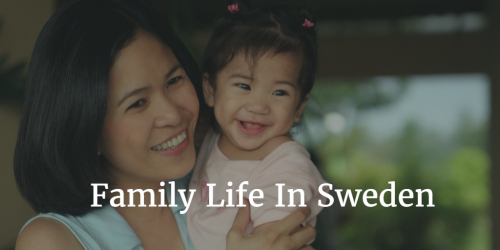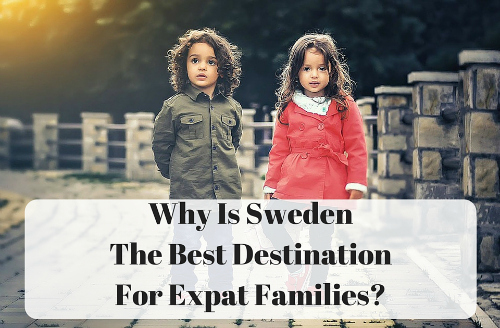No country in the world is perfect, but for many people around the world, the Scandinavian countries – and Sweden in particular – come closest to perfection. The great natural beauty, the quality of infrastructure and public services, the stable, developed economy and high incomes, the combination of individualism and minimal government interference with a strong sense of community and social responsibility, and many other factors make Sweden the ideal place to live.Officially known as the Kingdom of Sweden, this Northern European country is home to a large number of expats, and going by most individual opinions as well as the many surveys and studies that have been conducted here, most of them are extremely happy with the quality of their lives. In fact, at least one recent report, the Expat Explorer 2015 report by HSBC, said that Sweden was the location that expat families in particular were the happiest with.
In the overall rankings, based on factors ranging from earning prospects to integration with locals to the quality of education, Sweden placed third out of 39 countries. That by itself is of course an impressive assessment. However, when looking only at the aspects related to family life, Sweden did even better, beating all the other 38 countries that were surveyed. Other reports by organizations such as the United Nations (UN), the World Bank, and the Organisation for Economic Co-operation and Development (OECD) also rate Sweden extremely highly on a variety of parameters. So let’s have a closer look at why Sweden is the best destination for expat families.
Family life in Sweden
According to the Expat Explorer 2015 report, the three main factors that expat families love about Sweden are the education system, the government’s policies on families, and the living environment.

Education is free in Sweden, and this translates into huge cost savings for families with children. The quality of this education is of course of utmost importance, and the Swedish system compares very well with the best in the world. In addition, as a bonus, school lunches are free across the country, and many schools also provide free breakfasts. As with many things in Sweden, while this isn’t a central concern, it does make life easier and smoother for both parents and children. Learning the local language is necessary, but in general, expat parents say that this isn’t a problem.
Government policies in Sweden are highly supportive of parents – for example, the law allows for a total of 480 days’ parental leave, which can be split between parents in any way they choose. This equality and flexibility means that fathers can and often do contribute more to child-raising than they would in most other countries.
The quality of childcare is high, and here too, costs are subsidized. Naturally, this benefits everyone involved – workers are able to return to work whenever they are ready to do so, without worrying about their children or struggling to balance their finances, and children can be attended to while their parents are away.
Sweden’s environment also encourages a better quality of life for families. Good quality housing is affordable, Sweden’s cities are well developed and well planned, and the Swedish countryside is gorgeous. The climate, the natural beauty, and the general sense of safety and security mean that children are able to spend a considerable amount of time outdoors. Adult expats too say that they live more active, healthy lives in Sweden than they did back home. Throughout the year, there are a range of outdoor activities to enjoy, from skiing and a variety of winter sports to fishing, hiking, and foraging in the summer.
Transport infrastructure in Sweden is also great, in terms of both quality and connectivity. As a result, there is plenty of opportunity for family travel, allowing expats to explore the country’s beautiful coastline, lakes, fjords, and forests. For those who are interested in seeing other countries, the neighboring Scandinavian countries are easily accessible, and mainland Europe is only a little bit further.
Healthcare is another important consideration for expat families, and the publicly-funded system in Sweden is among the best in the world. Some Swedes and some expats choose to have private health insurance, but all residents, including expats, have access to the national healthcare system for very nominal fees, and healthcare is free until the age of 20. As with many public healthcare systems around the world, there are often complaints in Sweden about wait times; however, these are usually not too bad, and emergencies are attended to very promptly. Dental care is not part of the general healthcare system, and must be paid for, but it too is partially subsidized by the government.
Of course family life isn’t entirely about the children. Many expat couples report that living in Sweden has brought them closer together and improved the quality of their relationships. This isn’t surprising. Due to the factors just described, as well as many more, people are able to put more time and energy into their relationships, making them stronger and healthier.
Work-life balance
Apart from the direct support for family life in Sweden, what expats love about the country is the ability it gives them to strike a good balance between work and personal life.

According to the Expat Explorer 2015 report, 72 per cent of expats in Sweden said they had found a better work-life balance here, and 67 per cent of them said that the work culture was better. Both of these percentages are considerably higher than the global averages.
Expats in Sweden find that they can provide their families with a high standard of living without compromising on family time. Even by European standards, most Swedes enjoy an extremely short work week. The average work week in Sweden is only around 40-44 hours, and less than one per cent of employees in the country work more than 50 hours a week. This is considerably less than the European average and far below the global average.
The short work week has already been the standard in the country for a long time, but over the last few years, many companies have been going even further and experimenting with six-hour workdays. This is something that can primarily be found in startups and other young organizations, but even some well -established global corporations and public sector companies have been trying it out. Whether the trend continues or not will depend on whether companies see benefits – or at least no disadvantages – and it’s still too early for most of them to tell either way. However, the willingness to try this out is indicative of the general approach to work and life in Sweden.
Most employees in Sweden are also allowed flexible working hours that suit their lifestyle, allowing them to drop their children off to school and pick them up afterwards if necessary. Many companies also allow employees to work from home occasionally, which provides even more flexibility. After-work hours and weekends are strictly for personal time and family time, and both employers and employees will typically not expect or even allow this time to be impinged upon by work. For expats, this can take some getting used to, to the extent that turnaround times and response times might be longer; however, on the whole, most feel that they are more efficient and productive as a result, and that the positive effect on the work-life balance is undeniable.
Swedish companies on average are also generous with vacation days and sick leave. Many Swedes take a long family holiday every summer, and this can last for several weeks. There is also the Christmas break, which typically lasts for about a week, and the Easter break, which is usually shorter. There are other single-day holidays too, for a variety of festivals such as National Day, All Saints’ Day, Midsummer Day, and the feast of Saint Lucia, which often include communal celebrations of some sort.
Other positives – and a few challenges
There are of course many other important factors that families need to consider when choosing a location – the quality of family life isn’t the only consideration, and many other factors can indirectly affect family life in both the short and the long term.
Career prospects and potential earnings are important considerations for all expats, and Sweden, as one of the richest countries in the world, with a high GDP and high income levels, has a lot to offer here. Expats in Sweden say that they have more job security here, earn more, and find their careers progressing more quickly than they would in their home countries or in other expat locations.
Taxes are high, but the public services offered in return are of a high quality, and most people are left with enough disposable income and savings even after tax. In addition, the high earnings and career progress don’t translate to a situation where work takes over most of one’s life, as it can in places like Hong Kong, the USA and Singapore. According to expats, most workplaces in Sweden also wholeheartedly embrace diversity, making it easy for them to integrate into the country not just in their personal lives but in their professional lives as well.
Transport infrastructure in Sweden is excellent, which means that the work commute is usually very comfortable and stress-free. Sweden is also one of the best places in the world for cycling, with dedicated bike lanes almost everywhere. There is a general cultural awareness of and appreciation for cyclists, and drivers typically show them a great deal of consideration, all of which makes cycling in Sweden safe and enjoyable. Many expat families manage perfectly well between public transport and their own bicycles, with no real need for a car.
Of course, like any other country, Sweden has its own problems and challenges. Crime rates are reported to be higher than many other EU countries; however, these are still lower than most countries around the world, and for the most part, expats say they enjoy a strong sense of safety and security. The weather can be another challenge, depending on where you live. Although it is mostly mild throughout the year, some parts of the country have intense winters, and expats can find it difficult to deal with several months of freezing temperatures and little to no sunlight.
One particular challenge that many expats report grappling with is the difficulty in making friends with locals. This isn’t because of any hostility to foreigners, but rather because of the famed Swedish reticence, even with each other. The Swedes are very welcoming to outsiders and are accepting of cultural diversity; however, they mostly tend to keep to themselves, and can take a long time to form deeper friendships. Expats who share the solitary, reticent Swedish mentality are likely to find it easier to live in Sweden; for other expats, the first year or two can be particularly difficult. Nonetheless, friendships do happen, and many expats eventually end up with at least a few close local friends. In addition, according to the Expat Explorer 2015 report, around 39 per cent of expats reported finding a long-term partner since they moved to Sweden.
The language barrier is another problem – most Swedes speak English fairly well, so it’s possible for expats to get along without learning Swedish. However, those who make the mistake of relying on this fact will find themselves cut off from a lot of Swedish life, whether it’s reading labels in the supermarket or understanding casual workplace conversations. This problem can easily be avoided by learning Swedish, either before you arrive or within the first year, when everything is still new and your motivation levels are high.
Have you moved to Sweden? How was your experience of living there? Let us know in the comments.


